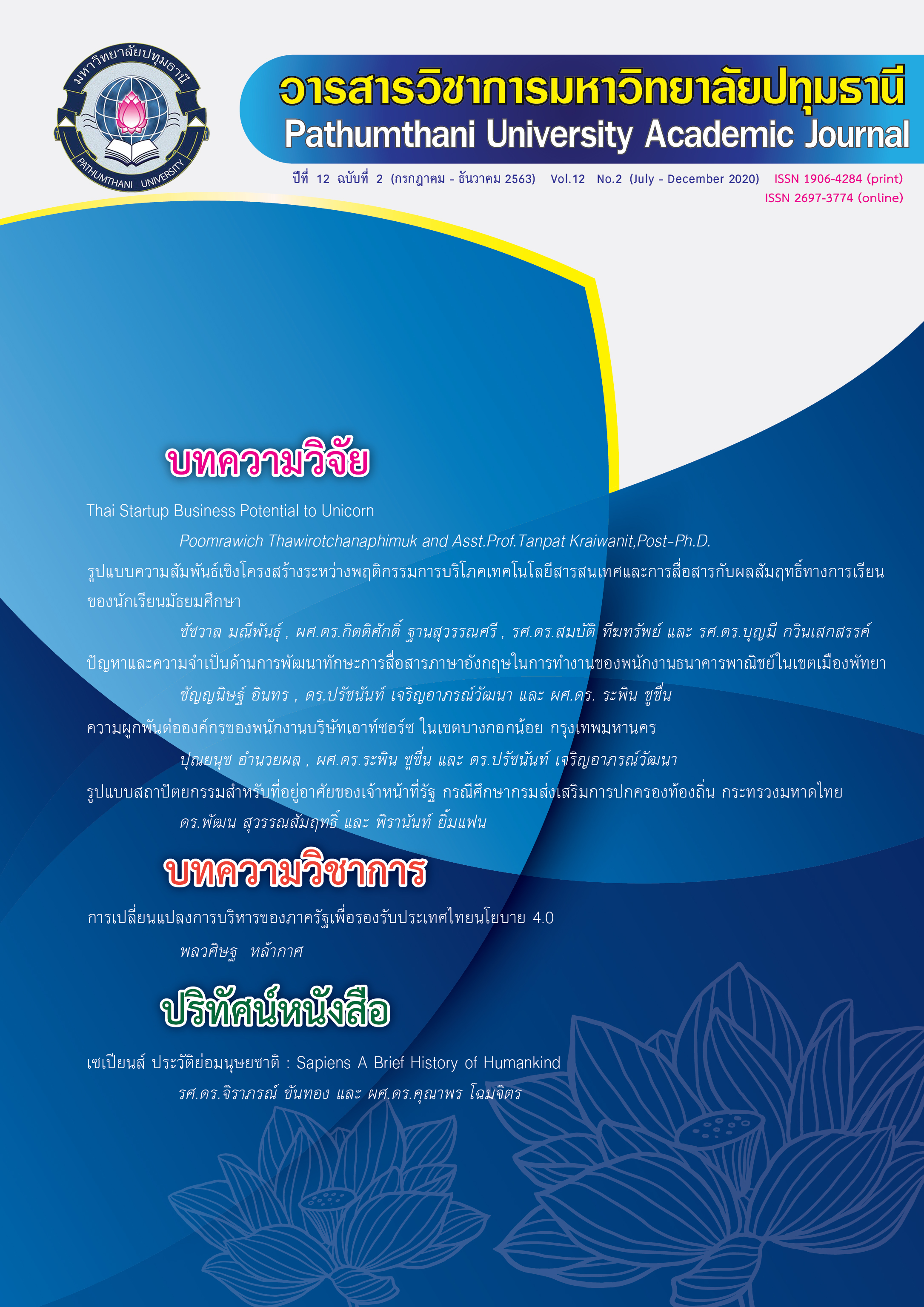การพัฒนาธุรกิจสตาร์ทอัพสู่ระดับยูนิคอร์นของธุรกิจไทย
Keywords:
Startup, Unicorn, Mobile FirstAbstract
This research aims to examine obstacles and factors affecting the improvement of potential of Thai startups to reach unicorn level, via eight Thai startups which have the highest fundraising in 2020. Data collection can be divided in to two methods: 1) collecting via an online survey from a group of 1,015 Generation Z individuals who dream of being business owners selected by the convenience sampling, and using logistic regression for data analysis and 2) in-depth interview of five startup owners.
According to the survey, as Omise and aCommerce are the most potential companies to become unicorns, they are used for analysis and the results indicate that both startups demonstrate four similar significant variables to enhance potential to become unicorns: 1) scores of knowledge in running a business, 2) the behavior of customers in a mobile-first era, 3) increasing goods and services, and 4) repurchasing. The in-depth iterview shows that inadequde funds can decrease the potential of competion with big companies; however, many startups have adopted technology to increase users and extend market rapidly. The study recommends that government should update and relax laws and regulations to enhance fundraising among Thai startups. For further studies, startup entrepreneurs, fundraising of startups, laws and regulations related to startups need to be examined in order to explore Thai startups in other extends thoroughly
References
ASEAN UP. (2020). The 6 Tech Unicorns of Southeast Asia. [Online] Available from https://aseanup.com/tech-unicorns-southeast-asia/
,Bangkokbiznews. (2019). InnoSpace raising funds agine, hoping within 10 years can build up a unicorn starup. [Online] Available from https://www.bangkokbiznews.com/news/ detail/854004
Bangkok Post. (2019). In search of unicorns. [Online] Available from https://www.bangkokpost.com/business/1650648/in-search-of-unicorns
Blank, S. (2010). What’s A Startup? First Principles. [Online] Available from https://steveblank.com/2010/01/25/whats-a-startup-first-principles/
Boone, L. W. (1990). “Creative thinking in business organizations”, Business Journal, 12 : 3.
Howkins, J. (2001), The Creative Economy: How People Make Money from Ideas. London: Penguin Books Ltd.
Khongjadturarerk, N. (2561). What is unicorn in a startup world?. Retrived from https://ciba.dpu.ac.th/unicorn-ในวงการสตาร์ทอัพคืออะไร/
Lerksirinukul, P. (2018). Startup 101: Read this to get vocabularies and understand startups quickly. [Online] Available from https://www.salika.co/2018/11/06/startup-101-introduction/
Levie, J. and Autio, E. (2008). “A theoretical grounding and test of the GEM model“, Small Business Economics. 31: 235-263.
Makmek, K. (2019). Techsauce reveal Thai startups increase potenciality but still stuck and cannot go globally. [Online] Available from https://forbesthailand.com/news/it/สตาร์ทอัพไทย.html
Maair, K & Fangjai, K. (2018). “The Critical Factors to Success of Startup Business in Thailand”, Payap University Journal. 28(2): 143-158.
Downloads
Published
How to Cite
Issue
Section
License
บทความที่ได้รับการตีพิมพ์เป็นลิขสิทธิ์ของวารสารมหาวิทยาลัยปทุมธานี
ข้อความที่ปรากฎในบทความแต่ละเรื่อง เป็นความคิดเห็นส่วนตัวของผู้เขียน กองบรรณาธิการไม่จำเป็นต้องเห็นด้วยเสมอไป และไม่มีส่วนรับผิดชอบใด ๆ ถือเป็นความรับผิดชอบของผู้เขียนแต่เพียงผู้เดียว



